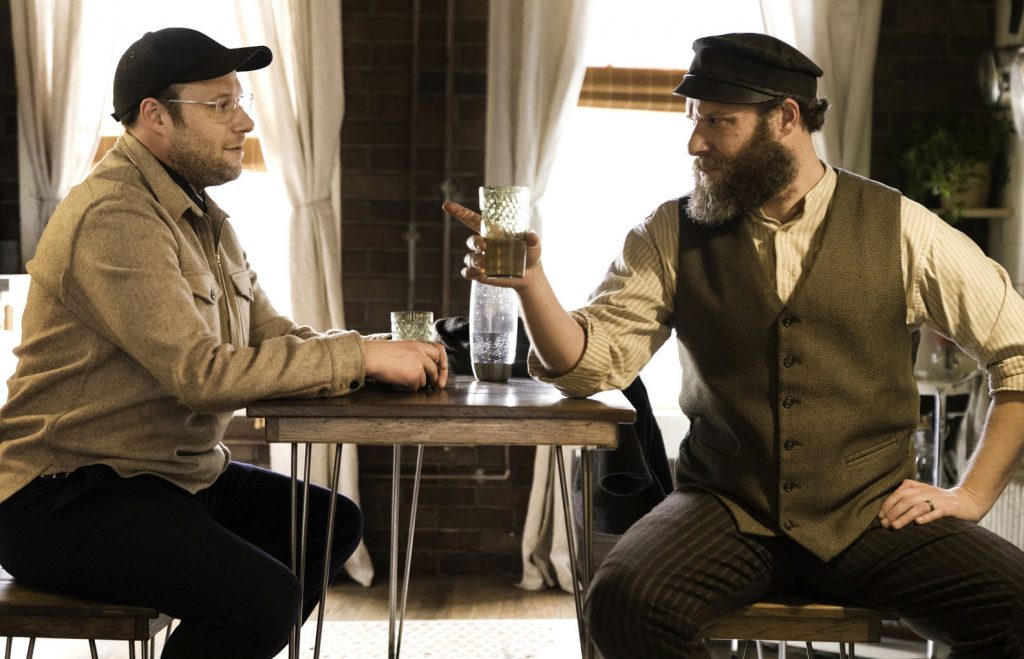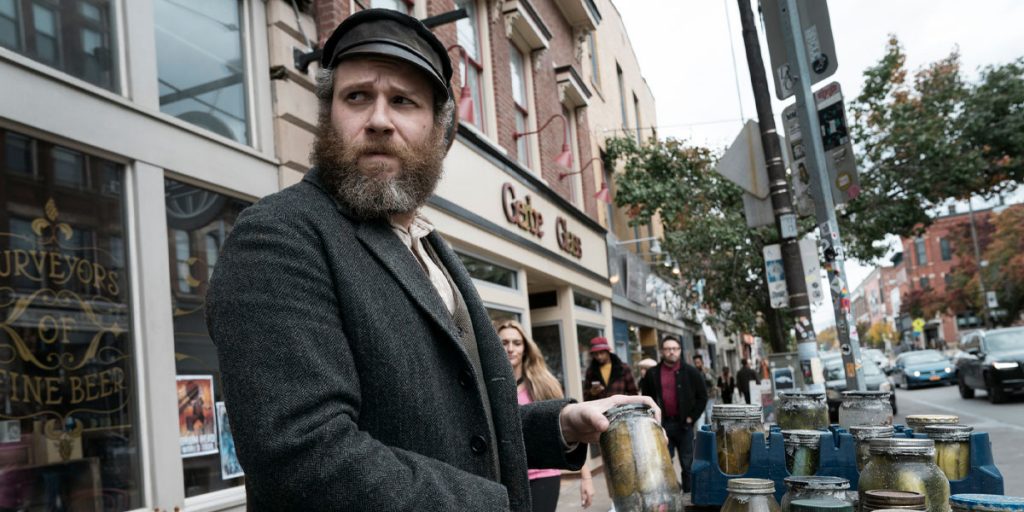An American Pickle is a solid effort that combines broad generational comedy with melancholic drama, bolstered by strong work from Seth Rogen.
An American Pickle tells the story of a Jewish immigrant in 1920 New York who is trapped in a pickle vat for a century from whence he emerges, a century later, and moves in with his hipster great grandson. The film opens with a delightful prologue filmed with muted colors in full frame pictures, as we meet Herschel Greenbaum (Seth Rogen), a ditch digger in a fictitious, harrowing Eastern European country. He narrates us through his love story, his deep misgivings about Russians, and his immigration to a new life in the United States. Silly and heartfelt, the scenes would not feel out of place in a Wes Anderson movie and set the stage wonderfully for the rest of the story. Alas, the film’s modern scenes never quite achieve the same level of comedic bliss.
When Herschel is awoken, a century later, he’s forced to deal with the pain of the realization that entire generations of his family had passed away during his slumber, and the culture shock of a hundred years of progress. Much of the film revolves the trying relationship between Herschel and his distant relative-cum-roommate Ben (also Seth Rogen). The pitfall of tonal whiplash forever remains the challenge for a filmmaker that dares to combine drama with comedy. An American Pickle, like so many others, struggles to achieve the balance but manages to make for compelling viewing regardless. There are really two films at play here: one, a broad inter-generational comedy about the conflict of values not entirely dissimilar from something like Meet the Parents; the other, a melancholy character drama about two men bonding over their experiences of grief and mourning. Both are worthy, but somehow the sum of the parts is less than one might hope.
As a performer, Seth Rogen seems drawn to these sorts of roles. Rogen has seen much box office success as a stoner, slacker archetype, but his best performances have all had ample doses of drama. 50/50 sees Rogen’s comedic charms muted, as he delivers a performance full of deep empathy as a man who simply wants to find a way to help his cancer-stricken buddy find his smile. Take This Waltz casts the actor as a loving, albeit boring, husband to a wife who considers an affair. It’s a tender, delicate performance, and not the sort of thing one might expect of an actor they only know from broad comedies. Even something a bit broader like Long Shot sees Rogan exercise his dramatic muscles far more than goofball ones.

This is a long-winded way of saying that Seth Rogen is a very good actor when he picks the right project. It’s easy to see what drew him to An American Pickle – the dual roles are naturally appealing to an actor, but the potential dramatic texture shines through. One scene in particular stands out: the elder Rogen (Herschel) sits with the younger (Ben) and they look through a photo album. The album is clearly not something Ben had ever paid much attention to, but, to the older, it is the only glimpse he will have of his children, and his children’s children. Rogen underplays the scene on both sides and leaves the viewers with something very affecting. It’s great, introspective acting.
An American Pickle does, however, struggle with tone. The inevitable falling out between Herschel and Ben leans too far into outright cruelty to make the preordained reconciliation feel credible (though it does help to give the film some surprising acidity). The movie also struggles under the weight of its efforts at modern social commentary – it vacillates wildly between lay-up hipster jokes and more complicated topics like race and social media. Nevertheless, it’s a solid effort that never overstays its welcome.

